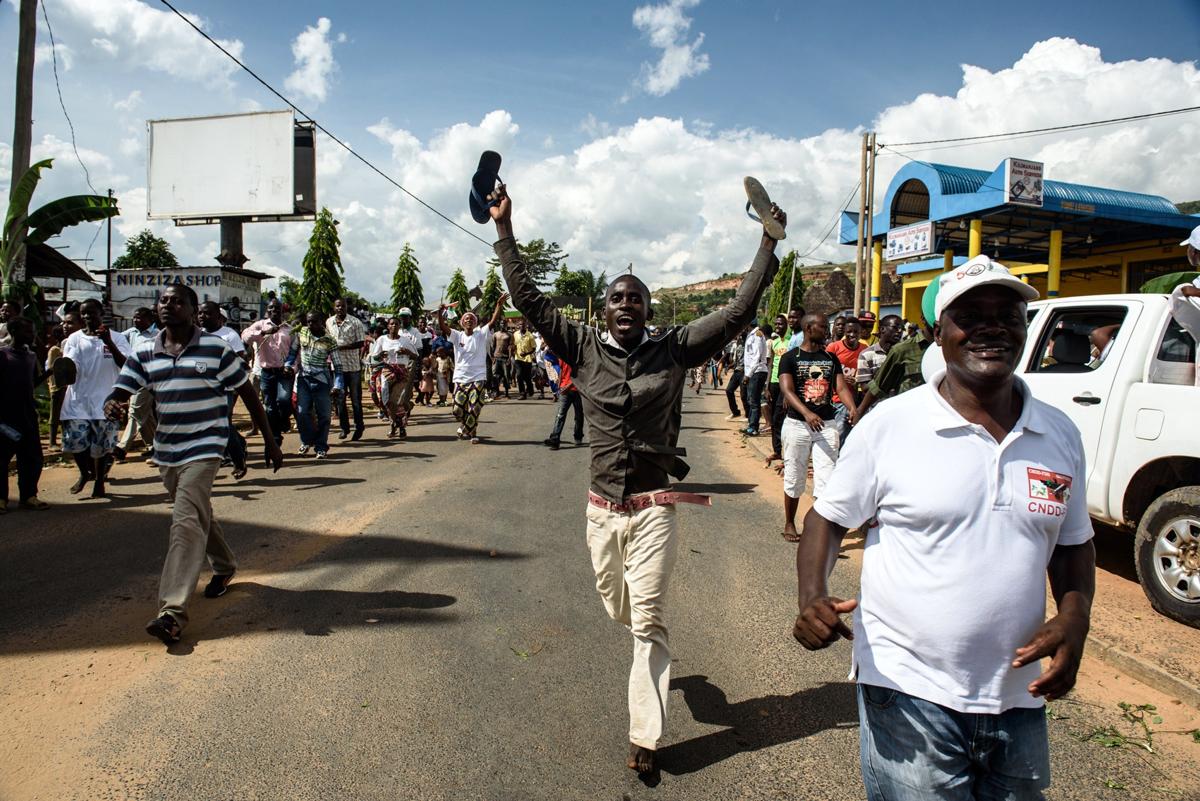By Clement Manirabarusha
Burundi’s electoral commission on Monday proposed possible dates for upcoming elections, though the move is unlikely to satisfy government opponents who have held weeks of protests calling the president’s bid for a third term unlawful.
The dispute over the upcoming presidential vote, originally scheduled for June 26, has thrown the country into weeks of chaos. The protesters say President Pierre Nkurunziza is violating the constitution by running, and Nkurunziza, backed by Burundi’s constitutional court, saying he can run.
The commission, known as CENI, proposed holding the presidential vote on July 15 and parliamentary elections – originally slated for June 5 and already delayed once – on June 26.
The commission also vowed to create a more open process, including allowing media houses closed during the protests to reopen.
No one from the opposition attended the meeting. Earlier in the day, a group of 17 opposition parties said it was committed to dialogue to resolve the crisis but also said they were committed to continuing the political fight to ensure Nkurunziza quit.
Also on Monday, Burundi’s presidential spokesman said the government had received donations from citizens to help fund the presidential polls and other elections, and expressed hope that Western donors will reverse a decision to halt election aid to avert more chaos.
Gervais Abayeho said the government had earmarked its own election funds and guaranteed voting would go ahead before Aug. 26, the end of the current term of President Pierre Nkurunziza, whose bid for a third mandate has led to protests.
The European Union, Belgium and the Netherlands suspended some aid last month to support the delayed elections. Diplomats said unrest meant the conditions were not right for a fair vote.
“We believe this was a very harsh decision,” Abayeho said of the aid suspension. “We hope it will be reviewed.
“If there are no elections here, the country will sink into chaos,” he said. “There will be lawlessness, there will be no elected institutions. What would happen here would be even worse than what they are imagining now.”
Although protests have subsided in recent days, Burundi is facing its worst crisis since the end of an ethnically charged civil war in 2005.
That conflict pitted majority Hutu rebel groups, including one led by Nkurunziza, against an army led by minority Tutsis. The latest tensions worry a region with a history of ethnic conflict, particularly Rwanda, victim of a 1994 genocide.
The government of Burundi, one of the world’s poorest nations, has earmarked 44 billion Burundi francs ($29 million). “If that is not enough, Burundi will knock on other doors,” he said, without citing other donors.
He said the government had received donations after an appeal to citizens in Burundi and abroad, without giving figures.
“The elections will take place,” he said. “That is guaranteed, because Burundians are contributing now, Burundians from inside and outside the country.”
FRENCH VERSION
Le différend sur le prochain scrutin présidentiel, initialementprévu pour le 26 juin, a jeté le pays dans la semaines de chaos.Les manifestants disent que le Président Pierre Nkurunziza violela constitution en course et Nkurunziza, soutenue par la Courconstitutionnelle du Burundi, disant qu’il peut exécuter.
La commission, appelée la CENI, a proposé la tenue du scrutinprésidentiel le 15 juillet et les élections législatives – a l’origineprévu pour le 5 juin et déjà reportée une fois – le 26 juin.
La commission a également promise de créer un processus plusouvert, y compris permettant aux médias fermés lors desmanifestations de rouvrir.
Aucun membre de l’opposition ont assisté à la réunion. Plus tôtdans la journée, un groupe de 17 partis de l’opposition a dit qu’ila été commis au dialogue pour résoudre la crise mais aussi ditqu’ils étaient déterminés à poursuivre la lutte politique pour que cesser de Nkurunziza.
Également le lundi, porte-parole de la présidence du Burundi a déclaré le gouvernement avait reçu des dons de citoyens pouraider à financer le scrutin présidentiel et autres élections et a exprimé l’espoir que les donateurs occidentaux seront inverseraune décision d’arrêter l’aide électorale pour éviter plus de chaos.
Gervais Abayeho dit le gouvernement avait affecté ses propresfonds électoraux et garantis vote serait allez-y avant le 26 août, àla fin du mandat actuel du Président Pierre Nkurunziza, dontl’offre pour un troisième mandat a conduit à des protestations.
L’Union européenne, la Belgique et les pays-bas suspenducertaines aides le mois dernier pour soutenir les électionsretardées. Diplomates dit troubles signifiait que les conditionsn’étaient pas bonnes pour un vote équitable.
« Nous croyons que ce fut une décision très dure, » Abayeho ditde la suspension de l’aide. “Nous espérons que ce sera examiné.
« S’il n’y a pas d’élections, le pays va sombrer dans le chaos, »dit-il. “Il y aura de non-droit, il n’y aura pas d’institutions élues.Ce qui se passerait ici serait encore pire que ce qu’ils sontimaginer maintenant. »
Bien que les protestations se sont apaisées ces derniers jours, lesBurundais est confrontée à sa pire crise depuis la fin d’une guerrecivile ethnique chargée en 2005.
Ce conflit oppose des groupes rebelles hutus majoritaire, dontl’une dirigée par Nkurunziza, contre une armée dirigée par laminorité Tutsi. Les dernières tensions s’inquiètent d’une régionavec une histoire de conflits ethniques, en particulier le Rwanda,victime d’un génocide de 1994.
Le gouvernement du Burundi, un des pays les plus pauvres du monde, a réservé à 44 milliards de francs burundais ($ 29millions). « Si cela ne suffisait pas, Burundi va frapper sur lesautres portes », a-t-il dit, sans citer d’autres bailleurs de fonds.
Il a dit que le gouvernement avait reçu des dons après un appelaux citoyens au Burundi et à l’étranger, sans donner de chiffres.
« Les élections auront lieu, » dit-il. « Qui est garantie, parce queles Burundais contribuent maintenant, burundais de l’intérieur età l’étranger. »


